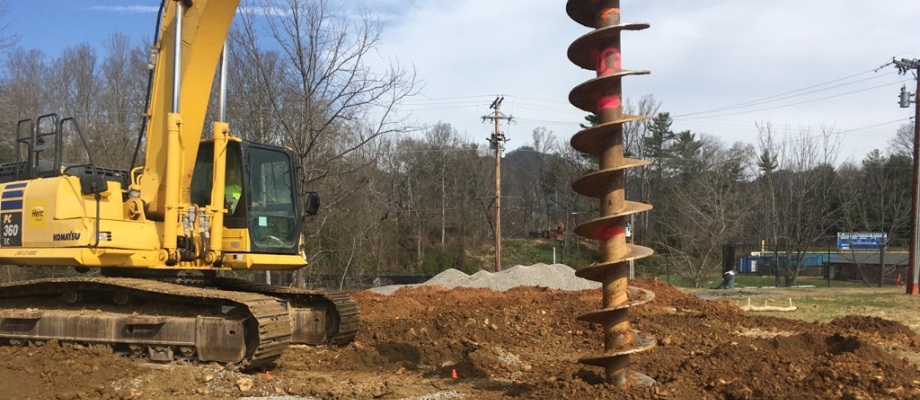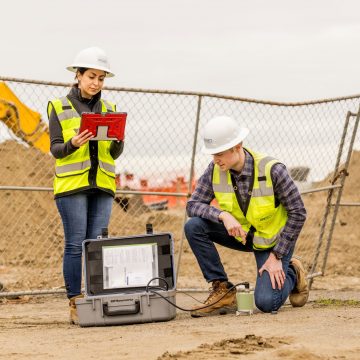Expert Consulting Engineer Solutions for Ingenious Infrastructure Solutions
Expert Consulting Engineer Solutions for Ingenious Infrastructure Solutions
Blog Article
The Interdisciplinary Approaches in the Geotechnical Market: Bridging the Space Between Engineering, Geology, and Environmental Scientific Research for Ideal Job End Results
The integration of engineering, geology, and ecological scientific research within the geotechnical market is not just helpful; it is important for achieving ideal job outcomes. What techniques might arise to facilitate this crucial cooperation and improve the effectiveness of geotechnical practices?
Significance of Interdisciplinary Cooperation
The importance of interdisciplinary partnership in the geotechnical sector can not be overstated. Effective geotechnical projects need the integration of varied know-how from various areas, including design, geology, and environmental scientific research. This collaboration guarantees that all facets of a job are considered, bring about detailed services that attend to intricate obstacles.
When functioning in isolation,Interdisciplinary partnership fosters development by enabling experts to share insights and methods that may not be noticeable. By leveraging the staminas of several self-controls, groups can identify possible threats, enhance style processes, and boost the sustainability of geotechnical tasks. Such collaboration advertises a holistic understanding of site-specific conditions, which is critical for precise analysis and decision-making.
The complexity of geotechnical jobs necessitates a collaborated method to analytic. When engineers, geologists, and ecological researchers interact, they can produce a cohesive strategy that aligns technical demands with ecological considerations and governing conformity. This harmony not just enhances job results however also adds to the long-lasting resilience of infrastructure. Inevitably, interdisciplinary cooperation is vital for progressing finest techniques and attaining excellence in the geotechnical sector.
Key Roles of Each Technique
Cooperation among various techniques is not simply useful; it is vital for the effective execution of geotechnical projects. Each technique-- engineering, geology, and environmental scientific research-- plays an unique yet interconnected role that adds to project efficacy and sustainability.
Geotechnical designers are mostly in charge of creating foundations and ensuring architectural integrity. They examine soil and rock properties to evaluate load-bearing abilities, offering necessary data for risk-free construction techniques. Their know-how makes it possible for the formulation of cutting-edge options to complex obstacles.

Ecological scientists evaluate the potential influences of building and construction on communities and water sources. They perform environmental evaluations and create reduction techniques to lessen adverse results. By integrating eco-friendly factors to consider, they ensure conformity with regulations and advertise sustainability throughout the task lifecycle.
Study of Successful Assimilation
Successful assimilation of geotechnical disciplines can be exhibited through various situation studies that highlight the efficiency of team effort in attending to complicated engineering difficulties. One notable example is the construction of the Hong Kong-- Zhuhai-- Macau Bridge, where a collective strategy involving geotechnical engineering, geology, and environmental scientific research was essential. Rock hounds and designers worked in unison to evaluate the seabed problems and maximize the foundation design, making sure security and lessening environmental effect.
An additional impactful case is the renovation of incline stability in the San Francisco Bay Location, where an interdisciplinary group integrated geotechnical evaluation with environmental analyses. By incorporating hydrological researches and geological surveys, the group successfully recognized prospective landslide risks and carried out reliable reduction actions, improving safety and sustainability.
Furthermore, the redevelopment of Brownfield sites commonly needs a multidisciplinary method. In one situation in Chicago, partnership among geotechnical designers, ecological researchers, and urban planners caused the effective removal of polluted dirt, permitting for the safe improvement of the site right into a neighborhood park. These case researches illustrate that interdisciplinary collaboration not only addresses technical challenges however likewise cultivates ingenious remedies that profit both communities and jobs.
Obstacles in Multidisciplinary Projects

Furthermore, collaborating timetables and operations amongst various teams can be problematic, specifically when each technique has distinct job landmarks and deliverables. This misalignment can lead to delays and increased prices. The challenge of source allocation additionally impends big; you could try here ensuring that specific competence is offered at vital points calls for cautious planning and insight.
Finally, regulative conformity poses one more substantial difficulty. Each self-control may deal with various regulatory structures, and lining up these needs to satisfy job goals can be intricate and time-consuming. Resolving these obstacles necessitates strong management and reliable communication approaches to cultivate cooperation and guarantee that multidisciplinary teams function cohesively towards shared objectives.
Future Trends in Geotechnical Practices
As the geotechnical sector advances, arising trends are improving practices to address the difficulties encountered in multidisciplinary projects - consulting engineer. One considerable pattern is the raised combination of sophisticated innovations, such as expert system and machine discovering, into geotechnical analysis and layout. These technologies boost predictive modeling and threat analysis, allowing engineers to make even more informed choices throughout the job lifecycle

Furthermore, the adoption of digital doubles and real-time surveillance systems is coming to be a lot more prevalent. These devices promote continuous analysis of dirt conditions and structural efficiency, allowing for prompt treatments when problems emerge.
Final Thought
To conclude, the integration of design, geology, and ecological scientific research is essential for achieving optimal outcomes in the geotechnical sector. Interdisciplinary partnership promotes innovation, enhances analytic abilities, and lines up technological demands with environmental sustainability. Effective instance research studies illustrate the benefits of this approach, while recognizing the challenges faced in multidisciplinary projects. Looking in advance, embracing these collaborative practices will certainly be essential for browsing future trends and progressing the area of geotechnical engineering.
The combination of design, geology, and ecological science within the geotechnical sector is not just helpful; it is essential for accomplishing optimum task end results. Efficient geotechnical jobs need the integration of varied competence from different fields, including engineering, geology, hop over to here and ecological science.Browsing the complexities of multidisciplinary tasks in the geotechnical industry presents several significant difficulties.As the geotechnical market develops, arising fads are improving practices to deal with the difficulties encountered in multidisciplinary projects. Geotechnical engineers are increasingly working together with ecological researchers to guarantee that tasks straighten with sustainability goals and abide with regulative needs.
Report this page